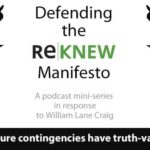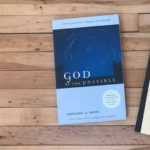We run our website the way we wished the whole internet worked: we provide high quality original content with no ads. We are funded solely by your direct support. Please consider supporting this project.
What is the significance of Deuteronomy 9:13–14, 18–20, 25?
The Lord tells Moses “Let me alone that I may destroy them [the Israelites] and blot out their name from under heaven…” (vs. 14). Moses later says to the Israelites, “the Lord intended to destroy you” (vs. 25). Moses interceded for forty days and then tells the Israelites, “the Lord listened to me…” (vs. 19). So too, “the Lord was so angry with Aaron that he was ready to destroy him, but [Moses] interceded also on behalf of Aaron at the same time” (vs. 20) and Aaron was spared.
If the future is exhaustively settled and known by God as such, the integrity of Scripture’s account of God’s expressed intention to destroy Israel and Aaron would be compromised. God cannot genuinely plan to do something he foreknows he will not do. If neither God nor inspired Scripture can be disingenuous, it seems these verses contradict the classical view of an exhaustively settled future.
Category: Q&A
Tags: Open Theism, Q&A
Topics: Open Theism
Verse: Deuteronomy 9
Related Reading

What do you think of the classical view that God is impassible?
The classical view has historically held that God is impassible, meaning he is above pathos (passion or emotions). The main reason the church came to this view was that, following the Hellenistic philosophical tradition, they associated emotions with change while believing God was above all change (immutable). Moreover, experiencing emotions implies that one is affected…

Podcast: What Does God Actually DO in the World?
Greg discusses what a God, who takes his hands off of us, who gives up control for us, who accommodates for us, actually does in the world. http://traffic.libsyn.com/askgregboyd/Episode_0215.mp3

Why You Have Free Will
God’s decision to create a cosmos that was capable of love and that was, therefore, populated with free agents (see previous post) was also a decision to create and govern a world he could not unilaterally control. These are two aspects of the same decision. What it means for God to give agents some degree…

Podcast: Defending the Manifesto (6 of 10)
Greg responds to challenges by William Lane Craig from Craig’s podcast “Reasonable Faith.“ Greg denies Molinism and discusses the logic of possibility. http://traffic.libsyn.com/askgregboyd/Episode_0061.mp3

What is the significance of 2 Kings 13:3–5?
The Lord judged the Israelites by allowing them to be oppressed by King Hazael of Aram (vs. 3). “But Jehoahaz entreated the Lord, and the Lord heeded him; for he saw the oppression of Israel, how the king of Aram oppressed them. Therefore the Lord gave Israel a savior, so that they escaped from the…

Podcast: The Making of God of the Possible
Greg talks about making his book “God of the Possible,” then offers his initial thoughts on Thomas Oord’s book “God Can’t.” http://traffic.libsyn.com/askgregboyd/Episode_0468.mp3
